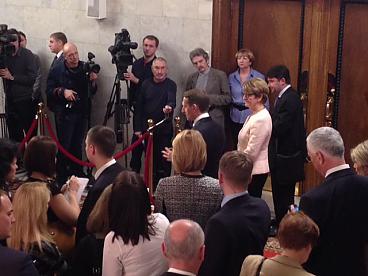SP Senator Kox: Isolating Russia would be dangerous
SP Senator Kox: Isolating Russia would be dangerous
The Council of Europe is continuing to seek a means of restoring cooperation with the State Duma - the Russian Parliament - within Europe’s biggest and oldest treaty organisation, according to SP Senator Tiny Kox. Kox’s statement followed discussions this week in Moscow with the leadership of the State Duma and the Russian delegation in the Parliamentary Assembly of the Council of Europe (PACE).

Press conference in Moscow with Duma president Sergey Naryshkin in the centre of the picture and Anne Brasseur, president of the Parliamentary Assembly of the Council of Europe to his right.
Since the spring relations have been seriously disrupted as a result of the crisis in Ukraine. Russian members of PACE have had their voting rights suspended until the end of the year, in response to which they have put their activities on a back burner. Kox, who chairs the United European Left group in the 315-strong assembly, argues that ‘we must not isolate Russia. That would be dangerous. That’s how accidents happen, certainly in times of geopolitical crisis.’
In Moscow Kox, accompanied by three fellow group leaders in PACE and Anne Brasseur, president of the Strasbourg-based assembly, met with Duma president Sergey Naryshkin – confidant of President Putin – and a large number of Russian MPs to discuss the need to prevent the tension in Europe from boiling over. The return of the Russian delegation in January to PACE, in which all forty-seven Council of Europe member states are represented, would send a positive signal in the midst of countless negative signals. The European Union’s twenty-eight member states will next Monday discuss a possible tightening of sanctions against Russia. President Obama is also threatening to impose greater punishment on Russia should the shaky ceasefire in Ukraine collapse. ‘In my view threatening still more sanctions is counterproductive and dangerous,’ says Kox. ‘Russia is threatening fresh measures against what President Putin calls “the dollar dictatorship” which, he believes, was born at the end of the Cold War and is making the world ever more unstable. Time and again massive economic and political damage are being caused, while we are getting not a step nearer to a real solution to the crisis in Ukraine and the danger of a new Cold War continues to grow.
‘I think it’s important that the Council of Europe at least can continue to function as a platform for parliamentary diplomacy,’ adds Kox. ‘Because of the sanctions Russian MPs can no longer come to Brussels to meet with the European Parliament, and nor are they permitted to go to EU member states to speak with national MPs. Only the Council of Europe is still permitted to receive them and give them indemnity from arrest if they want to speak to us outside Russia. That’s why I hope that in January common sense will prevail in the Parliamentary Assembly and Russia can once again take its place in the Council of Europe. We need the Russians, not because we agree with them but because we need a platform where we can look into what separates us and what unites us and in order to keep discussing how we prevent Europe from sinking anew into a Cold War, when we are only now celebrating ending it twenty-five years ago. Earlier in the week old hands like Gorbachev and Kissinger warned of a new Cold War. That’s the writing on the wall.’
Senator Kox also spoke to his Russian colleagues about the MH17 disaster. ‘In relation to that too the European sanctions clearly limit possibilities for the most effective cooperation between the Netherlands and Russia,’ he argues. ‘More intensive contact could have contributed to bringing about the earlier salvage of the remains of the aircraft and accelerating the enquiry into the causes. I hope that Dutch Foreign Minister Bert Koenders handles this matter more energetically than did his predecessor Frans Timmermans.'
